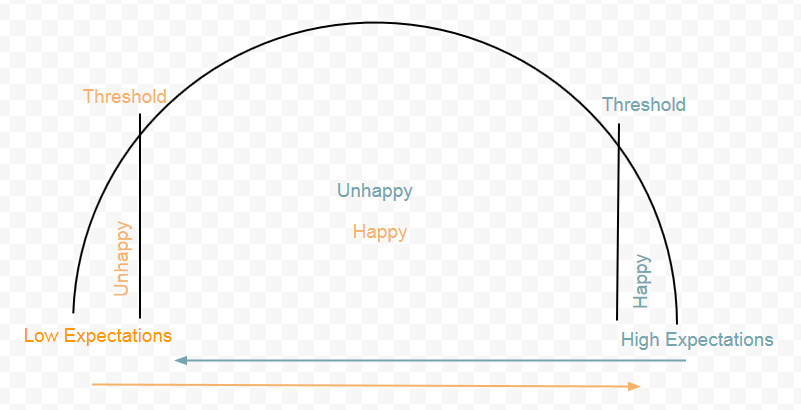Expectations and Happiness:
How could she not know you have to brush your teeth every day? How do they not know that treatment costs money and insurance isn’t going to cover it all?
These are questions you might find yourself asking. If so, you may be unhappy. In my opinion there’s a spectrum of happiness and expectations:
The right side of the chart is high expectations. The left side is low expectations. The threshold is the level at which your expectations have changed–That is either your low expectations were exceeded or your high expectations were not met.
Looking at the chart you can see that with low expectations, the orange portion, the majority of the chart is happiness with a small sliver of unhappiness if your low expectations were not met or just barely met. The blue portion, the high expectations, of the chart is the opposite. Most of it is unhappiness with a small sliver of happiness if your high expectations were met or just slightly less than met.
How does this translate to practical information?
Patients have low expectations of the dentist. Therefore doing something even slightly better than nothing will make them happy. They expect to wait a long time, pay a lot of money, be in pain or uncomfortable, and be met with indifference by their doctor. Pick one or more of these things and do them better and they’ll be pushed into the happy zone.
You have high expectations of your patients. You expect them to have knowledge of oral medicine (which most don’t), you expect them to understand medical terms (which most don’t), you expect them to value your services (which most don’t), you expect them to take care of the work they pay for (which they don’t). Many don’t know teeth have roots or that there’s bone under their gums.
How does this get resolved? Lower your expectations! The only reasonable expectations you should have of your patients are: expectation to pay for services rendered, and expectation to value your time. If your patients don’t meet those two criteria then that’s unacceptable.
When your expectations of your patients are lower it benefits you by increasing your happiness level but it also benefits them. Since you don’t expect them to know anything you might explain things to them more. Patients will begin to understand things like brushing is important and you have to floss under a bridge. It’s amazing how many people will say “no one ever told me that” about the simplest things like brushing or flossing.

